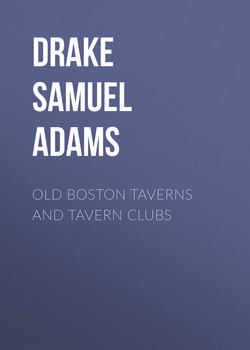Читать книгу Old Boston Taverns and Tavern Clubs - Drake Samuel Adams - Страница 4
III.
IN REVOLUTIONARY TIMES
ОглавлениеSuch thoroughfares as King Street, just before the Revolution, were filled with horsemen, donkeys, oxen, and long-tailed trucks, with a sprinkling of one-horse chaises and coaches of the kind seen in Hogarth’s realistic pictures of London life. To these should be added the chimney-sweeps, wood-sawyers, market-women, soldiers, and sailors, who are now quite as much out of date as the vehicles themselves are. There being no sidewalks, the narrow footway was protected, here and there, sometimes by posts, sometimes by an old cannon set upright at the corners, so that the traveller dismounted from his horse or alighted from coach or chaise at the very threshold.
Next in the order of antiquity, as well as fame, to the taverns already named, comes the Bunch of Grapes in King, now State Street. The plain three-story stone building situated at the upper corner of Kilby Street stands where the once celebrated tavern did. Three gilded clusters of grapes dangled temptingly over the door before the eye of the passer-by. Apart from its palate-tickling suggestions, a pleasant aroma of antiquity surrounds this symbol, so dear to all devotees of Bacchus from immemorial time. In Measure for Measure the clown says, “’Twas in the Bunch of Grapes, where indeed you have a delight to sit, have you not?” And Froth answers, “I have so, because it is an open room and good for winter.”
This house goes back to the year 1712, when Francis Holmes kept it, and perhaps further still, though we do not meet with it under this title before Holmes’s time. From that time, until after the Revolution, it appears to have always been open as a public inn, and, as such, is feelingly referred to by one old traveller as the best punch-house to be found in all Boston.
When the line came to be drawn between conditional loyalty, and loyalty at any rate, the Bunch of Grapes became the resort of the High Whigs, who made it a sort of political headquarters, in which patriotism only passed current, and it was known as the Whig tavern. With military occupation and bayonet rule, still further intensifying public feeling, the line between Whig and Tory houses was drawn at the threshold. It was then kept by Marston. Cold welcome awaited the appearance of scarlet regimentals or a Tory phiz there; so gentlemen of that side of politics also formed cliques of their own at other houses, in which the talk and the toasts were more to their liking, and where they could abuse the Yankee rebels over their port to their heart’s content.
But, apart from political considerations, one or two incidents have given the Bunch of Grapes a kind of pre-eminence over all its contemporaries, and, therefore, ought not to be passed over when the house is mentioned.
On Monday, July 30, 1733, the first grand lodge of Masons in America was organized here by Henry Price, a Boston tailor, who had received authority from Lord Montague, Grand Master of England, for the purpose.
